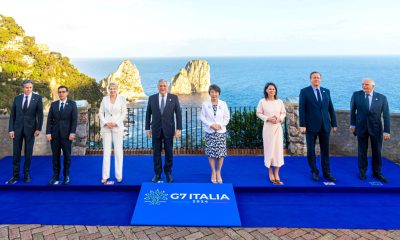EU
Các cuộc đàm phán của chính phủ #Italy kết thúc trong bế tắc, nhiều hơn vào tuần tới

 Talks to try to break the stalemate following Italy’s inconclusive election have failed to make progress, the president said on Thursday (5 April), calling for parties to be responsible in fresh consultations next week, viết Crispian Balmer và Gavin Jones.
Talks to try to break the stalemate following Italy’s inconclusive election have failed to make progress, the president said on Thursday (5 April), calling for parties to be responsible in fresh consultations next week, viết Crispian Balmer và Gavin Jones.
In two days of meetings with head of state Sergio Mattarella, political leaders did not appear to shift from their previous positions, with a mesh of apparently irreconcilable demands blocking the formation of a government.
“According to the rules of our democracy, it is necessary that there be some accords between different political forces to form a coalition,” Mattarella told reporters at the presidential palace. “This condition has not yet emerged.”
The March 4 vote produced deadlock, with a conservative bloc including the far-right League and Silvio Berlusconi’s Forza Italia (Go Italy!) emerging as the largest group, while the anti-system 5-Star Movement was the biggest single party.
Mattarella said a pause for reflection would be useful to let parties “evaluate responsibly the situation”. A source in his office said the new talks would not begin before Wednesday.
5-Star leader Luigi Di Maio reiterated a previous call for a German-style governing contract with either the League or the PD and said he wanted to meet their leaders to discuss policy.
This proposal has so far been rejected by both parties. The PD says it wants to go into opposition, while League leader Matteo Salvini has refused to break with his coalition ally Berlusconi, which is a condition posed by Di Maio.
Financial markets have so far taken the stalemate in their stride, but investors fear a possible tie-up between the League and 5-Star, which are both hostile to EU budget restrictions and demand that Italy be much more assertive in Brussels.
Salvini said he wanted to form a stable government with his centre-right allies, but acknowledged for that to happen they would need to hook up with the 5-Star.
However, Berlusconi made clear he wanted nothing to do with 5-Star, in response to its own rejection of him.
5-Star, which bases its appeal on a vow to clean up politics, points to Berlusconi’s 2013 conviction for tax fraud and brands the billionaire businessman a political failure tainted by years of graft scandals.
Di Maio said the fact the centre-right leaders had different positions on governing with 5-Star, and had met with Mattarella separately rather than as a bloc, showed they were already divided and not a genuine alliance.
The battered PD could act as a kingmaker, having the numbers in parliament to bring to life either a centre-right or a 5-Star government. But its leadership ruled out any such role and Salvini has also dismissed such a tie up.
“The negative election result does not allow us to formulate government solutions that include us,” the PD’s acting secretary Maurizio Martina said after his meeting with the president. ($1 = 0.8151 euro)
Chia sẻ bài viết này:
-

 Thuốc lá4 ngày trước
Thuốc lá4 ngày trướcTại sao chính sách của EU về kiểm soát thuốc lá không hiệu quả
-

 Trung Quốc-EU4 ngày trước
Trung Quốc-EU4 ngày trướcChung tay xây dựng một cộng đồng chia sẻ tương lai và tạo ra một tương lai tươi sáng hơn cho quan hệ đối tác toàn diện Trung Quốc-Bỉ cùng nhau hợp tác thân thiện
-

 Ủy ban châu Âu4 ngày trước
Ủy ban châu Âu4 ngày trướcViệc di chuyển không hoàn toàn tự do đến Vương quốc Anh dành cho sinh viên và lao động trẻ
-

 Trung Đông4 ngày trước
Trung Đông4 ngày trướcPhản ứng của EU trước cuộc tấn công tên lửa của Israel vào Iran đi kèm với cảnh báo về Gaza

























